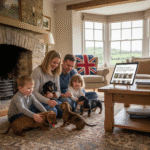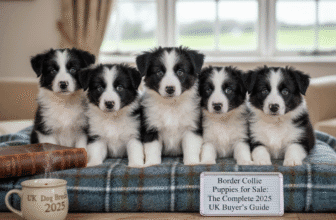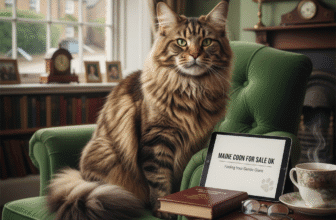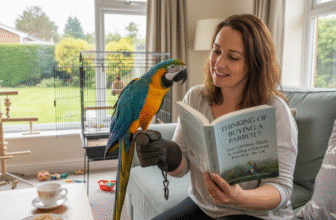
The Ultimate UK Guide to Finding Dachshund Puppies for Sale: A Responsible Buyer’s Handbook
There’s something undeniably captivating about a Dachshund. Whether it’s their comically long body, their surprisingly deep bark, or the unwavering confidence packed into that small frame, the “sausage dog” has well and truly waddled its way into the hearts of the British public. If you’re reading this, chances are you’ve fallen under their spell and are considering bringing a Dachshund puppy into your life. It’s an exciting prospect, but it’s also a journey that demands careful thought, thorough research, and a commitment to responsible ownership.
The phrase “Dachshund puppies for sale” can open a door to immense joy, but it can also lead to heartache if you’re not careful. The UK puppy market is fraught with pitfalls, from unscrupulous puppy farms to well-meaning but clueless backyard breeders. This guide is designed to help you navigate the process ethically and intelligently, ensuring your new companion comes from a happy, healthy background and that you are fully prepared for the unique adventure of owning a Dachshund.
Is a Dachshund Really the Right Dog for You?
Before you even type that search query, the first and most crucial step is to look beyond the cute pictures. Dachshunds were originally bred in Germany to hunt badgers – the name literally means “badger dog” (Dachs = badger, Hund = dog). This heritage has shaped their personality in ways that every potential owner must understand and appreciate.

- Bravery bordering on recklessness: They are courageous little dogs that don’t seem to grasp their small stature. They will readily take on much larger dogs, so vigilance is key during walks.
- Stubborn and intelligent: This is a powerful combination. They are quick to learn, but they’ll only do what you want if they see the benefit. Training requires patience, consistency, and a good sense of humour. House-training, in particular, can be a test of will.
- Incredibly loyal and loving: With their chosen family, Dachshunds are affectionate, cuddly, and fiercely loyal. They often bond very strongly with one person in particular.
- Surprisingly energetic: Don’t let those little legs fool you. They need regular daily exercise to stay physically and mentally fit. However, their exercise needs must be managed carefully due to their delicate backs.
- Born to dig: Your prize-winning petunias may be at risk! This instinct is strong, so providing a designated digging area or sandpit in the garden can be a great outlet for them.
- They have a voice and aren’t afraid to use it: Dachshunds are excellent watchdogs, which means they bark. They’ll bark at the postman, a leaf blowing past the window, or a change in the atmospheric pressure. This is something to consider if you live in a flat with thin walls.
If you’re looking for a placid, endlessly obedient lapdog that requires minimal effort, a Dachshund might not be the best fit. But if you want a companion with a huge personality, a mischievous spark, and an abundance of love to give, you might just have found your perfect match.
A Rainbow of Sausages: Understanding Dachshund Types
One of the joys of the breed is its variety. When you start your search, you’ll encounter a few key distinctions, primarily in size and coat type. It’s important to know what you’re looking for.
The Two Sizes:
- Standard: The original size. A healthy Standard Dachshund should weigh between 9kg and 12kg (around 20-27 lbs). They are robust and sturdy.
- Miniature: The more common size seen in the UK today. They should ideally weigh under 5kg (11 lbs) and be checked via a weigh-in at 12 months old.
The Three Coat Types:
- Smooth-Haired: The classic, sleek-coated Dachshund. Their coat is short, dense, and shiny, requiring minimal grooming – a quick brush once a week is usually sufficient.
- Long-Haired: Elegant and beautiful, with a silky, flowing coat that can be straight or slightly wavy. They require more grooming than their smooth-haired cousins to prevent matts and tangles, especially around their ears, belly, and feet.
- Wire-Haired: With their distinguished beards and eyebrows, Wire-Haired Dachshunds have a very different look. Their coat is short, thick, and harsh to the touch, with a softer undercoat. They need to be hand-stripped (not clipped) two or three times a year to maintain the coat’s correct texture and health.
Each coat type has a slightly different temperament stereotype. Smooths are often seen as the most quintessential, one-person Dachshunds. Longs are reputed to be a little gentler and calmer. Wires are often described as the most mischievous and clown-like of the three. Of course, individual personality is paramount, but it’s an interesting factor to consider.
The Search: How to Find a Reputable UK Breeder and Avoid the Horrors of Puppy Farms
This is, without a doubt, the most important part of your journey. A good breeder is your partner in this process; a bad one is a shortcut to potential financial and emotional disaster. Your goal is to find a breeder who prioritises the health, temperament, and welfare of their dogs above all else.
Hallmarks of a Reputable Breeder:
- They are registered with The Kennel Club (KC): Look for breeders who are part of the KC Assured Breeder Scheme. This isn’t a guarantee of perfection, but it means they have agreed to adhere to higher standards of care and welfare.
- They will interrogate you: A good breeder cares deeply about where their puppies are going. They will ask you about your home, your work schedule, your family, your garden, and your experience with dogs. Be prepared for a thorough vetting – it’s a very good sign!
- You will meet the mum: You must always, without exception, see the puppies with their mother. Observe her temperament. Is she friendly and relaxed? A healthy, happy mum is a great indicator of well-adjusted puppies.
- The puppies are raised in the home: Puppies should be raised inside the breeder’s home, not in an outbuilding or kennel. This ensures they are well-socialised and used to the sights, sounds, and smells of a normal household.
- They specialise in one or two breeds: A breeder who offers multiple “designer” breeds is a massive red flag. True enthusiasts dedicate themselves to perfecting and preserving their chosen breed.
- They are transparent about health testing: Ask to see health certificates for the parents. For Dachshunds, the most important tests are for Progressive Retinal Atrophy (PRA) (cord1) and Lafora disease. A responsible breeder will have screened their breeding dogs for these and other relevant conditions. They should also be knowledgeable and open about Intervertebral Disc Disease (IVDD).
- They provide comprehensive support: A good breeder will provide a puppy pack with food, a blanket with mum’s scent, KC registration documents, microchipping details, and a contract of sale. They will also offer a lifetime of support and advice.
Red Flags to Watch Out For:
- Meeting in a service station or car park: Never agree to this. It’s a classic tactic of puppy farmers to prevent you from seeing the awful conditions the dogs are kept in.
- The seller has multiple litters available: This is a sign of commercial farming, not responsible breeding.
- “Puppy is ready to go now”: Puppies must stay with their mother and littermates until they are at least 8 weeks old.
- No questions asked: If the seller is only interested in your money and doesn’t ask about your ability to care for the dog, walk away.
- The price is too good to be true: Bargain puppies often come with hidden costs in the form of health and behavioural problems.
The Financial Commitment: The True Cost of a Dachshund
The initial purchase price of a well-bred Dachshund puppy from a reputable UK breeder can range from £1,500 to £3,000, and sometimes more for specific colours or lines. But this is just the beginning.
You must also budget for:
- Initial setup: Crate, bed, bowls, harness (never a collar for walking, to protect their neck and back), leads, toys, puppy gates, and car restraint. This can easily cost £300-£500.
- Food: A high-quality diet is essential. Expect to spend £30-£50 per month.
- Insurance: This is non-negotiable for a Dachshund due to their predisposition to IVDD. A lifetime policy is essential and can cost anywhere from £40 to £80+ per month.
- Vet costs: Initial vaccinations and neutering can be several hundred pounds. Annual boosters, flea, and worm treatments add up.
- Training: Puppy socialisation and training classes are vital and typically cost £10-£20 per session.
Owning a Dachshund is a significant financial commitment for the next 12-16 years. It’s crucial to be honest with yourself about whether you can afford not just the purchase price, but the ongoing care they deserve.
A Note on Health: Understanding IVDD
We cannot discuss Dachshunds without talking about Intervertebral Disc Disease (IVDD). Their long spine and short legs make them genetically prone to this condition, where the cushioning discs between the vertebrae bulge or burst, pressing on the spinal cord. It can cause pain, nerve damage, and in severe cases, paralysis.
While you can’t eliminate the risk, you can significantly reduce it:
- Choose a good breeder: Responsible breeders are now participating in a KC/Dachshund Health UK screening scheme which involves X-raying potential breeding dogs’ backs to grade them for calcifications. Ask breeders if they participate in this scheme.
- Keep them lean: Excess weight puts enormous strain on their spine. Keeping your Dachshund at a healthy weight is the single most important thing you can do for their back health.
- No jumping: Do not let them jump on or off furniture or in and out of the car. Use dog ramps or steps and lift them correctly – one hand under the chest and the other supporting their rear end, keeping their spine level.
- Use a harness: Always walk your Dachshund on a harness, not a collar, to avoid pressure on their neck.
Being aware of IVDD isn’t about being scared; it’s about being a prepared and proactive owner. With the right care and precautions, your Dachshund can live a long, happy, and active life.
Welcome Home!
Bringing your puppy home is a day you’ll never forget. Have everything prepared in advance. Set up a designated “safe space” for them, like a crate with a comfy bed, where they can retreat when they feel overwhelmed. Begin house-training immediately, taking them out frequently, especially after waking up, after playing, and after eating. Be patient and use positive reinforcement.
The journey of raising a Dachshund puppy is a marathon, not a sprint. There will be chewed slippers, puddles on the floor, and moments where their stubbornness will test your sanity. But there will also be endless cuddles, hilarious antics, and the unwavering companionship of a dog with more personality than its little body can contain. By choosing to buy responsibly, you are not only giving a puppy the best possible start in life, but you are also refusing to support the cruel puppy farm trade. You’re investing in a healthy, well-adjusted family member, and that is truly priceless.







